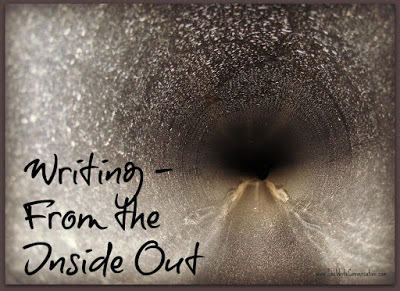Edie Melson's Blog, page 368
August 24, 2015
Do You Have Unrealistic Expectations for Social Media? Part XI, Social Media Basics for Writers
 by Edie Melson @EdieMelson
by Edie Melson @EdieMelson“I’m not getting any traction with social media,” is one of the complaints I hear a lot as I travel and teach writers how to connect.
There are a lot of reasons people feel this way, a few are legit, but most are just unreasonable expectations. Today I’m going to address the unrealistic exception for social media that many have.
Unrealistic ExpectationsThe more time I spend on Facebook and Twitter, the more friends and followers I’ll have. I’ve addressed this one several times, but I still hear it the most. Truthfully, after you’ve come up to speed on social media, spending more than thirty minutes a day on social media will trap you in the law of diminishing returns. This is a case of work smarter, not harder.
I’m spending time talking about my book, but my sales aren’t reflecting that. If you’re spending the most of your social media updates on yourself or your product, you’ve missed the point of social media. Social media is about building one-on-one relationships, it’s NOT an advertising platform. Building relationships will increase your reach and more people will hear about your book. THAT is where your increase in sales will come. Making your social media updates all about (or even one half about) you will drive people away and you may see a decrease.
 Social Media is a fast way to increase my reach. Well…not so much. Like anything worth while it takes time—and consistency—to build a following. It took me about nine months to go from about seventy-five Twitter followers to one thousand. Then about a year to go from that to ten thousand followers.
Social Media is a fast way to increase my reach. Well…not so much. Like anything worth while it takes time—and consistency—to build a following. It took me about nine months to go from about seventy-five Twitter followers to one thousand. Then about a year to go from that to ten thousand followers.I need to stay current with all the new social media platforms. Again, not really. The thinner you spread yourself, the shallower your reach. To get to the majority of your audience who’s on social media, you need to be on Twitter and Facebook. And you need to have a place where you are blogging regularly—that can be a personal blog or a group blog. If you find another platform you love (like Pinterest) find a way to work it into your thirty minutes a day.
I need to balance my time equally between Facebook, Twitter and Blogging. You do need to have a presence on all three, but you’ll find your own sweet spot. That’s where you need to concentrate your efforts. Do you have five thousand Facebook fans and only seven hundred Twitter followers? Then Facebook is your sweet spot. Spend the majority of your time there. Maintain an audience with the other two, but go with your passion. That strategy will always get you further. Beyond that, you’ll enjoy it more.
 A social media platform is more important than anything to sell your book to a publisher. It is important, but without an excellent product (a well-written manuscript) it’s practically worthless. That’s another reason it’s so important not to spend more than thirty minutes a day on social media.
A social media platform is more important than anything to sell your book to a publisher. It is important, but without an excellent product (a well-written manuscript) it’s practically worthless. That’s another reason it’s so important not to spend more than thirty minutes a day on social media.Social media isn’t a fast pass to a super Internet presence. As I’ve said before, anything worth having takes…well…work.
BUT that doesn’t mean you shouldn’t work at it. It can give you a distinct advantage when you’re looking for a publisher for your book, and when you’re trying to connect to readers for your book.
What expectations have you found that are unrealistic when it comes to social media? Do you struggle in a specific area—if so, share your thoughts in the comments section and we'll see if we can come up with a solution.
Don't forget to join the conversation
Blessings,
Edie
TWEETABLES
#Writers, do you have unrealistic expectations for #socialmedia - @EdieMelson has some tips (Click to Tweet)
#Writers, is your #socialmedia growing like you think it should? @EdieMelson shares insights (Click to Tweet)
If you've missed the previous posts in this series, here they are:
Part I—Know Where You are and Where You’re GoingPart II—When Should a Writer Start Building a Social Media NetworkPart III—Targeting Millennials: Snapchat’s 3 Most Dominant Brands & Their Tactics Part IV—Dealing with Facebook SpamPart V—How to Use Hashtags in Social Media
Part VI—Is Twitter Worth the Bother?
Part VII—Get Started with Hootsuite
Part VIII—Tips for Composing Effective Social Media Updates
Part IX—What Do I Say On Social Media? 23 Conversation Starters for Authors
Part X—Tips to Help Writers Get More Twitter Followers
Published on August 24, 2015 01:00
August 23, 2015
Why Are You Worried?
by Brenda McGraw @BrendaMMcGraw
 “I lift up my eyes to the hills—where does my help come from?” Psalm 121:1
“I lift up my eyes to the hills—where does my help come from?” Psalm 121:1
Myhelp comes from the Lord.
If we live long enough we are going to have something that rocks our world. It steals our peace and joy. I call these “Joy Zappers.”
What is stealing your peace and joy today?
Is it the lack of money, or debt? What has you worried?
Sickness and pain can zap our joy and steal our peace.
We can have the pressures of caring for a parent. Or we may have a job we don’t like and dread going in everyday, which causes us to not want to get up every morning.
There are many things that can zap our joy. I have named a few, but there are also frustrations, relationships, kids, stress, addictions, school, grief, fear and the list could go on.
 Life is hard. But what did Jesus tell the disciples in John 16:33? He said, “In me you may have peace. In this world you will have trouble. But take heart! I have overcome the world.”
Life is hard. But what did Jesus tell the disciples in John 16:33? He said, “In me you may have peace. In this world you will have trouble. But take heart! I have overcome the world.”
I learned to trust the Lord when life got tough several years ago while going through a divorce. When I lifted my tears to God in prayer, He embraced and comforted me. He surprised me with little gifts from friends, which helped me pay unexpected car repairs. He spoke to me through His word when I needed encouraging. He sent people to cut my grass when I didn’t have a lawn mower.
God was there for me and He helped me when I was at my lowest, so I know I can trust Him through anything.
In Psalm 121, the Lord assures us, “He who watches over you will not slumber.” He tells us. “He will keep us from harm and He will watch over our life; He will watch over our coming and going both now and forevermore.”
We can trust Him. So, why do we worry when worrying doesn’t do anything for us?
I wish I knew the answer. I can’t honestly say I never worry. But I can honestly say that many times what we worry about never even happens.
The next time we are tempted to worry, we need to turn our eyes towards Jesus, Try to turn our worry to prayers and focus on Christ. We can be confident that He cares about what is going on in our life. He is never going to leave us and He will never harm us.
Even through the days that rock our world and zap our joy we can look at Jesus and know that “He’s got this.”
Is there something you are worrying about today? If you answer “yes” in the comments I will lift you up in my prayers. God knows the details.
“I lift up my eyes to the mountains—where does my help come from?My help comes from the Lord, the Maker of heaven and earth.He will not let your foot slip—He who watches over you will not slumber;.The Lord will keep you from all harm—He will watch over your life;the Lord will watch over your coming and going both now and forevermore.”
Psalm 121:1-3, 7-8
 Brenda McGraw is an author and speaker who reveals how to discover joy beyond the clutter of life. She draws from her own life experiences in the #1 Amazon Best seller, “Joy Beyond, 28 Days to Finding Joy Beyond the Clutter of Life”. She is the founder of Ask God Today Ministries where she has a team of writers sharing truth and hope with others.
Brenda McGraw is an author and speaker who reveals how to discover joy beyond the clutter of life. She draws from her own life experiences in the #1 Amazon Best seller, “Joy Beyond, 28 Days to Finding Joy Beyond the Clutter of Life”. She is the founder of Ask God Today Ministries where she has a team of writers sharing truth and hope with others.
Brenda currently lives in South Carolina with her husband, Jeff and three of their five children. She is a survivor of breast cancer and a heart attack.. Despite the challenges she has endured, Brenda found peace through her relationship with Jesus Christ.
You can connect with Brenda at:Website - http://www.askgodtoday.com Amazon Author Page: http://www.amazon.com/Brenda-McGraw/e/B00GOIE7AG Twitter: https://www.twitter.com/BrendaMMcGraw
 “I lift up my eyes to the hills—where does my help come from?” Psalm 121:1
“I lift up my eyes to the hills—where does my help come from?” Psalm 121:1Myhelp comes from the Lord.
If we live long enough we are going to have something that rocks our world. It steals our peace and joy. I call these “Joy Zappers.”
What is stealing your peace and joy today?
Is it the lack of money, or debt? What has you worried?
Sickness and pain can zap our joy and steal our peace.
We can have the pressures of caring for a parent. Or we may have a job we don’t like and dread going in everyday, which causes us to not want to get up every morning.
There are many things that can zap our joy. I have named a few, but there are also frustrations, relationships, kids, stress, addictions, school, grief, fear and the list could go on.
 Life is hard. But what did Jesus tell the disciples in John 16:33? He said, “In me you may have peace. In this world you will have trouble. But take heart! I have overcome the world.”
Life is hard. But what did Jesus tell the disciples in John 16:33? He said, “In me you may have peace. In this world you will have trouble. But take heart! I have overcome the world.”I learned to trust the Lord when life got tough several years ago while going through a divorce. When I lifted my tears to God in prayer, He embraced and comforted me. He surprised me with little gifts from friends, which helped me pay unexpected car repairs. He spoke to me through His word when I needed encouraging. He sent people to cut my grass when I didn’t have a lawn mower.
God was there for me and He helped me when I was at my lowest, so I know I can trust Him through anything.
In Psalm 121, the Lord assures us, “He who watches over you will not slumber.” He tells us. “He will keep us from harm and He will watch over our life; He will watch over our coming and going both now and forevermore.”
We can trust Him. So, why do we worry when worrying doesn’t do anything for us?
I wish I knew the answer. I can’t honestly say I never worry. But I can honestly say that many times what we worry about never even happens.
The next time we are tempted to worry, we need to turn our eyes towards Jesus, Try to turn our worry to prayers and focus on Christ. We can be confident that He cares about what is going on in our life. He is never going to leave us and He will never harm us.
Even through the days that rock our world and zap our joy we can look at Jesus and know that “He’s got this.”
Is there something you are worrying about today? If you answer “yes” in the comments I will lift you up in my prayers. God knows the details.
“I lift up my eyes to the mountains—where does my help come from?My help comes from the Lord, the Maker of heaven and earth.He will not let your foot slip—He who watches over you will not slumber;.The Lord will keep you from all harm—He will watch over your life;the Lord will watch over your coming and going both now and forevermore.”
Psalm 121:1-3, 7-8
 Brenda McGraw is an author and speaker who reveals how to discover joy beyond the clutter of life. She draws from her own life experiences in the #1 Amazon Best seller, “Joy Beyond, 28 Days to Finding Joy Beyond the Clutter of Life”. She is the founder of Ask God Today Ministries where she has a team of writers sharing truth and hope with others.
Brenda McGraw is an author and speaker who reveals how to discover joy beyond the clutter of life. She draws from her own life experiences in the #1 Amazon Best seller, “Joy Beyond, 28 Days to Finding Joy Beyond the Clutter of Life”. She is the founder of Ask God Today Ministries where she has a team of writers sharing truth and hope with others.
Brenda currently lives in South Carolina with her husband, Jeff and three of their five children. She is a survivor of breast cancer and a heart attack.. Despite the challenges she has endured, Brenda found peace through her relationship with Jesus Christ.
You can connect with Brenda at:Website - http://www.askgodtoday.com Amazon Author Page: http://www.amazon.com/Brenda-McGraw/e/B00GOIE7AG Twitter: https://www.twitter.com/BrendaMMcGraw
Published on August 23, 2015 01:00
August 22, 2015
Remember to Write in Faith
by Edie Melson @EdieMelson
Now faith is confidence in what we hope for and assurance about what we do not see. Hebrews 11:1

Sometimes I need to be reminded that, prepared or not, the outcome of my writing is in God’s capable hands. Sure I need to be obedient and do my homework. But then, I have to leave the results up to him.
Even the SMALL results.
He’s in charge of how each article, scene or blog post turns out— as well as how the book turns out. He cares about every aspect of my writing. He cares about the people who will read it and WHEN they read it.
My part is small, just obedience. I know what you're thinking, and I agree. It’s small, but it's NOT easy. We have to remember that the big stuff is God's. It’s not our place to think too far ahead in the process. Only He knows the end from the beginning.
When I let go of control—and just write in faith—my joy returns.
How about you. How do you Write in Faith when times get tough?
I invite you to use this image any way you like online. Post it to your blog, share it on Facebook, Twitter, Pinterest, anywhere you'd like. All I ask is that you keep it intact, with my website watermark visible.
Don't forget to join the conversation!Blessings,Edie
Now faith is confidence in what we hope for and assurance about what we do not see. Hebrews 11:1

Sometimes I need to be reminded that, prepared or not, the outcome of my writing is in God’s capable hands. Sure I need to be obedient and do my homework. But then, I have to leave the results up to him.
Even the SMALL results.
He’s in charge of how each article, scene or blog post turns out— as well as how the book turns out. He cares about every aspect of my writing. He cares about the people who will read it and WHEN they read it.
My part is small, just obedience. I know what you're thinking, and I agree. It’s small, but it's NOT easy. We have to remember that the big stuff is God's. It’s not our place to think too far ahead in the process. Only He knows the end from the beginning.
When I let go of control—and just write in faith—my joy returns.
How about you. How do you Write in Faith when times get tough?
I invite you to use this image any way you like online. Post it to your blog, share it on Facebook, Twitter, Pinterest, anywhere you'd like. All I ask is that you keep it intact, with my website watermark visible.
Don't forget to join the conversation!Blessings,Edie
Published on August 22, 2015 01:00
August 21, 2015
Writers—We Have to Use it or Lose It!
by Bruce Brady @BDBrady007
 My recent long-term layoff has taught me several important things about the writing life.
My recent long-term layoff has taught me several important things about the writing life.
One of those is the fact that the longer the time between writing sessions, the more difficult it becomes to get back into the habit.
Extended periods of not using our talents may result in our giving up altogether. And that’s not good for any writer, especially those who are under contract or dealing with deadlines.Matthew 25 (ESV) tells the parable of the talents. While on the surface this story refers to money, it also refers to the personal talents and abilities we’re given. The master’s distribution of the talents clearly indicates that the servants had differing abilities, but were expected to use them as best they could for the benefit of the master. And this is still true today. Whether we’re prolific writers or slow, methodical ones, doesn’t matter. If we’re blessed with the writing talent, then we must use what we have to benefit the master, whether that master is God or our readers.
 We don't all have the same gifts or the same calling.Another point in this parable is that the master didn’t expect the servants to perform equally. He recognized that they didn’t possess the same abilities. He just wanted each servant to do the best they could. And that’s all we can expect of ourselves. So we shouldn’t compare our work to others’.
We don't all have the same gifts or the same calling.Another point in this parable is that the master didn’t expect the servants to perform equally. He recognized that they didn’t possess the same abilities. He just wanted each servant to do the best they could. And that’s all we can expect of ourselves. So we shouldn’t compare our work to others’.
We can’t all be a Nora Roberts or a Jerry B. Jenkins. We all differ in our abilities because each of us is supposed to reach a distinct audience. It matters not if we become bestselling authors or if our entire writing career is spent blogging, or just writing letters or stories for family members—never to be seen by the general public. It’s been my observation that writing for fame or fortune eventually drives readers away. I believe using our talents to benefit others should be our highest goal.
This parable makes another clear point. If we don’t use our talents, they will be taken from us. Procrastination is not our friend. And it is often the result of fear. Because the servant with the one talent feared he would lose it, he buried it. He could have observed the one with five talents, then tried his best to produce similar results. But instead, he let fear dictate his actions.
 We must over come our fears and write!Whether we fear failure, or success, if we feel the need to write, then we should write. Every day. Even if it’s junk. Even if we have to dictate our thoughts and let someone or some software program put the words on the screen or paper. We must do whatever it takes to routinely write.
We must over come our fears and write!Whether we fear failure, or success, if we feel the need to write, then we should write. Every day. Even if it’s junk. Even if we have to dictate our thoughts and let someone or some software program put the words on the screen or paper. We must do whatever it takes to routinely write.
Have you stopped writing because you’re producing junk? Perhaps, like me, you’ve stopped because you’re facing health or physical challenges. Don’t worry about the cause. Just keep writing. Whatever you can as often as you can. You can perfect it later. Find a way to keep going.
If you are called to write, if you have a talent for writing, then write! Don’t let anything stop you. As long as you can think, you can write. There is a way. Your readers need your words. And you will not be happy unless you share those words with them.
What are some ways you keep writing, even when life gets hard? Be sure to leave your thoughts in the comments section below.
TWEETABLE
Writers—We Have to Use it or Lose it - thoughts from @BDBrady007 on @EdieMelson (Click to Tweet)
 Bruce Brady is an author, writer and playwright. His work has appeared in Focus on the Family’s Thriving Family, www.ChristianDevotions.us, and on stage. Currently, Bruce is working on a Young Adult Novel about a boy who must deal with the death of his dad, being bullied, and helping his mom through her grief. His first five pages took third place in the ACFW South Carolina Chapter’s “First Five Pages” contest.
Bruce Brady is an author, writer and playwright. His work has appeared in Focus on the Family’s Thriving Family, www.ChristianDevotions.us, and on stage. Currently, Bruce is working on a Young Adult Novel about a boy who must deal with the death of his dad, being bullied, and helping his mom through her grief. His first five pages took third place in the ACFW South Carolina Chapter’s “First Five Pages” contest.
When he’s not writing, Bruce spends time learning from and helping other writers. He serves as Mentor of Word Weavers International’s Online Chapter, and as a member of Cross ‘N’ Pens, The Writer’s Plot, ACFW’s National and South Carolina Chapters.
“My dream is to entertain my readers and give them hope as they travel the rocky road of life.”
 My recent long-term layoff has taught me several important things about the writing life.
My recent long-term layoff has taught me several important things about the writing life.One of those is the fact that the longer the time between writing sessions, the more difficult it becomes to get back into the habit.
Extended periods of not using our talents may result in our giving up altogether. And that’s not good for any writer, especially those who are under contract or dealing with deadlines.Matthew 25 (ESV) tells the parable of the talents. While on the surface this story refers to money, it also refers to the personal talents and abilities we’re given. The master’s distribution of the talents clearly indicates that the servants had differing abilities, but were expected to use them as best they could for the benefit of the master. And this is still true today. Whether we’re prolific writers or slow, methodical ones, doesn’t matter. If we’re blessed with the writing talent, then we must use what we have to benefit the master, whether that master is God or our readers.
 We don't all have the same gifts or the same calling.Another point in this parable is that the master didn’t expect the servants to perform equally. He recognized that they didn’t possess the same abilities. He just wanted each servant to do the best they could. And that’s all we can expect of ourselves. So we shouldn’t compare our work to others’.
We don't all have the same gifts or the same calling.Another point in this parable is that the master didn’t expect the servants to perform equally. He recognized that they didn’t possess the same abilities. He just wanted each servant to do the best they could. And that’s all we can expect of ourselves. So we shouldn’t compare our work to others’.We can’t all be a Nora Roberts or a Jerry B. Jenkins. We all differ in our abilities because each of us is supposed to reach a distinct audience. It matters not if we become bestselling authors or if our entire writing career is spent blogging, or just writing letters or stories for family members—never to be seen by the general public. It’s been my observation that writing for fame or fortune eventually drives readers away. I believe using our talents to benefit others should be our highest goal.
This parable makes another clear point. If we don’t use our talents, they will be taken from us. Procrastination is not our friend. And it is often the result of fear. Because the servant with the one talent feared he would lose it, he buried it. He could have observed the one with five talents, then tried his best to produce similar results. But instead, he let fear dictate his actions.
 We must over come our fears and write!Whether we fear failure, or success, if we feel the need to write, then we should write. Every day. Even if it’s junk. Even if we have to dictate our thoughts and let someone or some software program put the words on the screen or paper. We must do whatever it takes to routinely write.
We must over come our fears and write!Whether we fear failure, or success, if we feel the need to write, then we should write. Every day. Even if it’s junk. Even if we have to dictate our thoughts and let someone or some software program put the words on the screen or paper. We must do whatever it takes to routinely write.Have you stopped writing because you’re producing junk? Perhaps, like me, you’ve stopped because you’re facing health or physical challenges. Don’t worry about the cause. Just keep writing. Whatever you can as often as you can. You can perfect it later. Find a way to keep going.
If you are called to write, if you have a talent for writing, then write! Don’t let anything stop you. As long as you can think, you can write. There is a way. Your readers need your words. And you will not be happy unless you share those words with them.
What are some ways you keep writing, even when life gets hard? Be sure to leave your thoughts in the comments section below.
TWEETABLE
Writers—We Have to Use it or Lose it - thoughts from @BDBrady007 on @EdieMelson (Click to Tweet)
 Bruce Brady is an author, writer and playwright. His work has appeared in Focus on the Family’s Thriving Family, www.ChristianDevotions.us, and on stage. Currently, Bruce is working on a Young Adult Novel about a boy who must deal with the death of his dad, being bullied, and helping his mom through her grief. His first five pages took third place in the ACFW South Carolina Chapter’s “First Five Pages” contest.
Bruce Brady is an author, writer and playwright. His work has appeared in Focus on the Family’s Thriving Family, www.ChristianDevotions.us, and on stage. Currently, Bruce is working on a Young Adult Novel about a boy who must deal with the death of his dad, being bullied, and helping his mom through her grief. His first five pages took third place in the ACFW South Carolina Chapter’s “First Five Pages” contest.When he’s not writing, Bruce spends time learning from and helping other writers. He serves as Mentor of Word Weavers International’s Online Chapter, and as a member of Cross ‘N’ Pens, The Writer’s Plot, ACFW’s National and South Carolina Chapters.
“My dream is to entertain my readers and give them hope as they travel the rocky road of life.”
Published on August 21, 2015 01:00
August 20, 2015
The Art of Two-Dimensional Characters
by Cyle Young @CyleYoung
 A master novelist paints his story with dynamic two-dimensional characters. The characters are woven into the story like puzzle pieces. Each is important to the final picture, but standing alone they bring no significant revelation to the final image.
A master novelist paints his story with dynamic two-dimensional characters. The characters are woven into the story like puzzle pieces. Each is important to the final picture, but standing alone they bring no significant revelation to the final image.
Two-dimensional characters are flat. They lack depth, are partially developed, and often are stereotypically inclined.
But stories need two-dimensional characters. They bring the story to life, birthing a necessary reality for the main characters, and layering a believable background.I experienced this, a few years ago, when I decorated 20,000 square feet of wall space with an underwater and island theme. The walls were painted with full-size murals containing beautiful images, animals, and landscapes. Each mural was originally two-dimensional. The paintings were flat against the wall. But as decorated and ornate as they were, they felt bland.
When I decided to add three-dimensional ornaments to the walls, they came to life. The murals had focal points that drew a person’s attention. But as helpful as the three-dimensional rocks and coral were, they would have been useless without the two-dimensional background. The setting brought the three-dimensional objects to life.
 It’s the same way in a story.
It’s the same way in a story.
Two-dimensional characters create a believable setting, which allows the main character to spring into life. With careful planning and placement these characters often go unnoticed.
Well-crafted two-dimensional characters:Resemble an archetypeThey exist as a typical example or stereotype of a type of person.Fit neatly into the story and settingThey blend into the background to enhance mood, setting, plot, etc.Are predictable and logicalThey act in ways that are predictable for the main character as to not draw attention away from main or sub plots.Have no past or futureThey exist only in the moment, and are not fleshed out for the reader.Are perfectTheir flaws are never revealed and they exist in perfection for a moment.Lack depth and personalityTheir personality, character, attitude, and behavior are never explored.
Attempting to create a story without two-dimensional characters is like painting a Bob Ross style painting without the happy trees. The painting would look bland, lacking depth and vibrancy.
Every good story needs depth and vibrancy—it needs its happy trees.
Make sure you spend time ensuring your next story contains well-selected two-dimensional characters that allow your plot and main characters to flourish. Your story will shine and your reader will be pulled into the believable familiarity.
TWEETABLEThe Art of 2-Dimensional Characters. They CAN Enhance Your Story - @CyleYoung on @EdieMelson (Click to Tweet)
 Cyle Young is thankful God blessed him with the uniqueness of being an ADD-riddled…SQUIRREL!...binge writer. Not much unlike the classic video game Frogger, Cyle darts back and forth between various writing genres. He crafts princess children’s stories, how-to advice for parents, epic fantasy tales, and easy readers.
Cyle Young is thankful God blessed him with the uniqueness of being an ADD-riddled…SQUIRREL!...binge writer. Not much unlike the classic video game Frogger, Cyle darts back and forth between various writing genres. He crafts princess children’s stories, how-to advice for parents, epic fantasy tales, and easy readers.
Learn more about Cyle on his website www.cyleyoung.com. Or check him out on www.facebook.com/cyleyoung or www.twitter.com/cyleyoung.
 A master novelist paints his story with dynamic two-dimensional characters. The characters are woven into the story like puzzle pieces. Each is important to the final picture, but standing alone they bring no significant revelation to the final image.
A master novelist paints his story with dynamic two-dimensional characters. The characters are woven into the story like puzzle pieces. Each is important to the final picture, but standing alone they bring no significant revelation to the final image.Two-dimensional characters are flat. They lack depth, are partially developed, and often are stereotypically inclined.
But stories need two-dimensional characters. They bring the story to life, birthing a necessary reality for the main characters, and layering a believable background.I experienced this, a few years ago, when I decorated 20,000 square feet of wall space with an underwater and island theme. The walls were painted with full-size murals containing beautiful images, animals, and landscapes. Each mural was originally two-dimensional. The paintings were flat against the wall. But as decorated and ornate as they were, they felt bland.
When I decided to add three-dimensional ornaments to the walls, they came to life. The murals had focal points that drew a person’s attention. But as helpful as the three-dimensional rocks and coral were, they would have been useless without the two-dimensional background. The setting brought the three-dimensional objects to life.
 It’s the same way in a story.
It’s the same way in a story.Two-dimensional characters create a believable setting, which allows the main character to spring into life. With careful planning and placement these characters often go unnoticed.
Well-crafted two-dimensional characters:Resemble an archetypeThey exist as a typical example or stereotype of a type of person.Fit neatly into the story and settingThey blend into the background to enhance mood, setting, plot, etc.Are predictable and logicalThey act in ways that are predictable for the main character as to not draw attention away from main or sub plots.Have no past or futureThey exist only in the moment, and are not fleshed out for the reader.Are perfectTheir flaws are never revealed and they exist in perfection for a moment.Lack depth and personalityTheir personality, character, attitude, and behavior are never explored.
Attempting to create a story without two-dimensional characters is like painting a Bob Ross style painting without the happy trees. The painting would look bland, lacking depth and vibrancy.
Every good story needs depth and vibrancy—it needs its happy trees.
Make sure you spend time ensuring your next story contains well-selected two-dimensional characters that allow your plot and main characters to flourish. Your story will shine and your reader will be pulled into the believable familiarity.
TWEETABLEThe Art of 2-Dimensional Characters. They CAN Enhance Your Story - @CyleYoung on @EdieMelson (Click to Tweet)
 Cyle Young is thankful God blessed him with the uniqueness of being an ADD-riddled…SQUIRREL!...binge writer. Not much unlike the classic video game Frogger, Cyle darts back and forth between various writing genres. He crafts princess children’s stories, how-to advice for parents, epic fantasy tales, and easy readers.
Cyle Young is thankful God blessed him with the uniqueness of being an ADD-riddled…SQUIRREL!...binge writer. Not much unlike the classic video game Frogger, Cyle darts back and forth between various writing genres. He crafts princess children’s stories, how-to advice for parents, epic fantasy tales, and easy readers.Learn more about Cyle on his website www.cyleyoung.com. Or check him out on www.facebook.com/cyleyoung or www.twitter.com/cyleyoung.
Published on August 20, 2015 01:00
August 19, 2015
Writing From the Inside Out
by Katy Kauffman @KatyKauffman28
 I hardly ever cry at movies. I cried at the end of Inside Out. Even though it’s a kids’ movie, I saw how the inside of our brains might work when anger, fear, disgust, sadness, or joy takes the helm.
I hardly ever cry at movies. I cried at the end of Inside Out. Even though it’s a kids’ movie, I saw how the inside of our brains might work when anger, fear, disgust, sadness, or joy takes the helm.
Each feeling was embodied in a little colored creature whose outward appearance matched its personality. Short, blue Sadness couldn’t help but be drawn to sad things and turn the little girl’s memories blue (or sad), while tall, cheerful Joy tried to keep Sadness distracted and in check.
At the end (I won’t give it away), I felt what the characters felt and knew firsthand the feelings that were being portrayed on screen. I had lived them. From the inside out.
When we write, we want to impact the reader from the inside out. We want them to relate to what we’re saying—that we understand the struggles they’re facing because we’ve been there or know of someone who has. That we know of a solution and it has worked for us or a loved one. We want the reader to feel like we’re in the boat with them instead of on shore yelling at them. An effective book, devotion, or article is written from the inside out.
We want them to relate to what we’re saying—that we understand the struggles they’re facing because we’ve been there or know of someone who has. That we know of a solution and it has worked for us or a loved one. We want the reader to feel like we’re in the boat with them instead of on shore yelling at them. An effective book, devotion, or article is written from the inside out.
We can tackle a topic two ways: from the outside looking in or from the inside looking out. A reader will be able to tell when we’re trying to talk about a subject that we don’t have much knowledge in. They may appreciate our effort, but our message will lose some of its effectiveness. But if we share about something that we’ve lived or have closely observed, then we can write about it with insight, feeling, and persuasion. Consider the difference between these two opening lines for a book about peace:
In the middle of a storm, you can find peace in God.
That’s true. But read the line amplified below, and see if you think the author has lived what she’s writing.
 In the middle of a storm that makes you question your certainty of the truth, that tests your resolve every day, and that causes you to cry out to God, you can find in Him a peace that will calm your heart, renew your strength, and guide you safely through.
In the middle of a storm that makes you question your certainty of the truth, that tests your resolve every day, and that causes you to cry out to God, you can find in Him a peace that will calm your heart, renew your strength, and guide you safely through.
In the second line, do you think the author is writing from the inside out? Can you hear the desperation in her voice as she describes the storm? We don’t want to be too dramatic or showy when we write, but we can show that we’ve been there. In the storm. In the victory. In the growing up process. Because the author writes about the specifics of the storm, would you take her at her word that the peace she describes is possible? Perhaps she has lived it. We don’t have to give more detail about our lives than is appropriate, but perhaps God wants us to use our story—our ups and downs, struggles and victories—to help someone who is traveling a similar road.
In the years that I wrote both of my Bible studies, I needed the principles I was studying. They became lifeto me, an empowering source for victory. As I embark in writing my third Bible study, I need this book, too. I need to learn from the book of Nehemiah how to walk in strength and to sustain joy when the enemy is doing his best to destroy my strength and joy. I pray that what I learn from Nehemiah will bless other’s people hearts to fortify their strength and renew their joy as well.
What you learn doesn’t have to stop with you. It can be passed to others (2 Timothy 2:2). What has God taught you that would bless someone else’s life? What is He leading you to write about? How can you encourage someone else and still guard your family’s privacy and your own? May God lead you to write from the inside out and pass along the treasures that have enriched your life.
Tell us below what treasures God has taught you. What have you learned from the “inside out”? Join the conversation!
TWEETABLE#Writing from the Inside Out - Insight from author @KatyKauffman28 on @EdieMelson (Click to Tweet)
 Katy Kauffman is an award-winning writer and a co-founder of Lighthouse Bible Studies, a ministry which seeks to connect people to God through His Word. She has taught the Bible to women and teens, and has two published Bible studies for women, 2 Timothy: Winning the Victory and Faith, Courage, and Victory. Her heart’s desire is for women to know and love God, understand the richness of His Word, and fulfill His plan for their lives. Katy is also the designer of Broken but Priceless: The Magazine. She makes her home near Atlanta, Georgia. Connect with her further on Facebook and Twitter.
Katy Kauffman is an award-winning writer and a co-founder of Lighthouse Bible Studies, a ministry which seeks to connect people to God through His Word. She has taught the Bible to women and teens, and has two published Bible studies for women, 2 Timothy: Winning the Victory and Faith, Courage, and Victory. Her heart’s desire is for women to know and love God, understand the richness of His Word, and fulfill His plan for their lives. Katy is also the designer of Broken but Priceless: The Magazine. She makes her home near Atlanta, Georgia. Connect with her further on Facebook and Twitter.
 I hardly ever cry at movies. I cried at the end of Inside Out. Even though it’s a kids’ movie, I saw how the inside of our brains might work when anger, fear, disgust, sadness, or joy takes the helm.
I hardly ever cry at movies. I cried at the end of Inside Out. Even though it’s a kids’ movie, I saw how the inside of our brains might work when anger, fear, disgust, sadness, or joy takes the helm. Each feeling was embodied in a little colored creature whose outward appearance matched its personality. Short, blue Sadness couldn’t help but be drawn to sad things and turn the little girl’s memories blue (or sad), while tall, cheerful Joy tried to keep Sadness distracted and in check.
At the end (I won’t give it away), I felt what the characters felt and knew firsthand the feelings that were being portrayed on screen. I had lived them. From the inside out.
When we write, we want to impact the reader from the inside out.
 We want them to relate to what we’re saying—that we understand the struggles they’re facing because we’ve been there or know of someone who has. That we know of a solution and it has worked for us or a loved one. We want the reader to feel like we’re in the boat with them instead of on shore yelling at them. An effective book, devotion, or article is written from the inside out.
We want them to relate to what we’re saying—that we understand the struggles they’re facing because we’ve been there or know of someone who has. That we know of a solution and it has worked for us or a loved one. We want the reader to feel like we’re in the boat with them instead of on shore yelling at them. An effective book, devotion, or article is written from the inside out.We can tackle a topic two ways: from the outside looking in or from the inside looking out. A reader will be able to tell when we’re trying to talk about a subject that we don’t have much knowledge in. They may appreciate our effort, but our message will lose some of its effectiveness. But if we share about something that we’ve lived or have closely observed, then we can write about it with insight, feeling, and persuasion. Consider the difference between these two opening lines for a book about peace:
In the middle of a storm, you can find peace in God.
That’s true. But read the line amplified below, and see if you think the author has lived what she’s writing.
 In the middle of a storm that makes you question your certainty of the truth, that tests your resolve every day, and that causes you to cry out to God, you can find in Him a peace that will calm your heart, renew your strength, and guide you safely through.
In the middle of a storm that makes you question your certainty of the truth, that tests your resolve every day, and that causes you to cry out to God, you can find in Him a peace that will calm your heart, renew your strength, and guide you safely through. In the second line, do you think the author is writing from the inside out? Can you hear the desperation in her voice as she describes the storm? We don’t want to be too dramatic or showy when we write, but we can show that we’ve been there. In the storm. In the victory. In the growing up process. Because the author writes about the specifics of the storm, would you take her at her word that the peace she describes is possible? Perhaps she has lived it. We don’t have to give more detail about our lives than is appropriate, but perhaps God wants us to use our story—our ups and downs, struggles and victories—to help someone who is traveling a similar road.
In the years that I wrote both of my Bible studies, I needed the principles I was studying. They became lifeto me, an empowering source for victory. As I embark in writing my third Bible study, I need this book, too. I need to learn from the book of Nehemiah how to walk in strength and to sustain joy when the enemy is doing his best to destroy my strength and joy. I pray that what I learn from Nehemiah will bless other’s people hearts to fortify their strength and renew their joy as well.
What you learn doesn’t have to stop with you. It can be passed to others (2 Timothy 2:2). What has God taught you that would bless someone else’s life? What is He leading you to write about? How can you encourage someone else and still guard your family’s privacy and your own? May God lead you to write from the inside out and pass along the treasures that have enriched your life.
Tell us below what treasures God has taught you. What have you learned from the “inside out”? Join the conversation!
TWEETABLE#Writing from the Inside Out - Insight from author @KatyKauffman28 on @EdieMelson (Click to Tweet)
 Katy Kauffman is an award-winning writer and a co-founder of Lighthouse Bible Studies, a ministry which seeks to connect people to God through His Word. She has taught the Bible to women and teens, and has two published Bible studies for women, 2 Timothy: Winning the Victory and Faith, Courage, and Victory. Her heart’s desire is for women to know and love God, understand the richness of His Word, and fulfill His plan for their lives. Katy is also the designer of Broken but Priceless: The Magazine. She makes her home near Atlanta, Georgia. Connect with her further on Facebook and Twitter.
Katy Kauffman is an award-winning writer and a co-founder of Lighthouse Bible Studies, a ministry which seeks to connect people to God through His Word. She has taught the Bible to women and teens, and has two published Bible studies for women, 2 Timothy: Winning the Victory and Faith, Courage, and Victory. Her heart’s desire is for women to know and love God, understand the richness of His Word, and fulfill His plan for their lives. Katy is also the designer of Broken but Priceless: The Magazine. She makes her home near Atlanta, Georgia. Connect with her further on Facebook and Twitter.
Published on August 19, 2015 01:00
August 18, 2015
Writing Quotes that Inspire and Keep You Moving forward
by Lucinda Secrest McDowell @LucindaSMcDowel
 “The place God calls you to is the place where your deep gladness and the world’s deep hunger meet.”
~ Frederich Buechner in “Wishful Thinking”
“The place God calls you to is the place where your deep gladness and the world’s deep hunger meet.”
~ Frederich Buechner in “Wishful Thinking”
That place for me is as a purveyor of “Encouraging Words.” And while I am in the middle of an intense book deadline, the following wisdom from admired writers helps keep me going. May you find something here as well to encourage your soul and fill your pen…
*When you wonder if it’s worth it to keep writing…"When the question comes, 'Are you still writing?' I hope your answer will always be, 'Of course I am writing. I am a writer.' Tomorrow the sun will rise, God willing, and it will be time again for us to go to our tables. It will be time to pick up the pen or turn on the machine... There are stories that must be told and must be heard, stories waiting on you and me to do the telling. Tomorrow we will write, write and not waste time. We will make dark marks on the page, the gift to which we have been given, the gift that has been given to us. Tomorrow we will go dancing again. Dancing on the head of a pen." ~ Robert Benson in "Dancing on the Head of a Pen"
*When you struggle with putting together stories into a meaningful format…
 “Writing is like canning is like life: preserving the present for future enjoyment, storing up today to use tomorrow. Writers rely daily on canned goods: our memories, for instance, as we rummage through our pantries for story, image, relevance. Writers gather the words, sort them on the tarp of paper or screen, run them through the hot bath of thought and analysis, of comparison and contrast. We peel and pare them, examine them, stuff them into containers, filled and sealed against the erosion of time. Protected from the forgetfulness that comes with passing seasons, a winter of deaths, a spring of new beginnings. And, those places of waiting for a new harvest of words to preserve for the future. Preserving. Canning. Here, we find it possible to once again break open the past for use in the present… With the succulent fruit of God’s faithfulness spilling over our palates, we taste and see, again and again, that the Lord is good.”
~ Jane Rubietta in “Worry Less So You Can Live More”
“Writing is like canning is like life: preserving the present for future enjoyment, storing up today to use tomorrow. Writers rely daily on canned goods: our memories, for instance, as we rummage through our pantries for story, image, relevance. Writers gather the words, sort them on the tarp of paper or screen, run them through the hot bath of thought and analysis, of comparison and contrast. We peel and pare them, examine them, stuff them into containers, filled and sealed against the erosion of time. Protected from the forgetfulness that comes with passing seasons, a winter of deaths, a spring of new beginnings. And, those places of waiting for a new harvest of words to preserve for the future. Preserving. Canning. Here, we find it possible to once again break open the past for use in the present… With the succulent fruit of God’s faithfulness spilling over our palates, we taste and see, again and again, that the Lord is good.”
~ Jane Rubietta in “Worry Less So You Can Live More”
*When you ask yourself, ‘Who will miss my book if I don’t write it?’…“A book is a soulish thing. It is physical – dots of ink and paper from old trees – and yet it feeds our minds and moves our wills. We read with our bodies; with our wills we choose to have our thoughts guided by the words of another person. Books connect us with ourselves and with others – and perhaps with God.” ~ John Ortberg in “Soul Keeping”
*When you are weary of the hard work and discipline of writing…“You are going to have to give and give and give or there’s no reason for you to be writing. You have to give from the deepest part of yourself, and you are going to have to go on giving, and the giving is going to have to be its own reward. There is no cosmic importance to your getting something published, but there is in learning to be a giver.” ~ Anne Lamott in “Bird by Bird”
*When you are remembering all those who have influenced you to this point… “A book is more a museum than a house. It’s full of other people’s treasures more than your own. It may be that the writer, like a museum curator, collects and arranges all the contents pleasingly, mounting artifacts in such a way as to draw attention to the small and curious details, explaining the wider significance of some otherwise nondescript relic or another, putting the masterpieces in their proper places. But mostly, he got the stuff elsewhere. Mostly, it’s all on loan. And even then, he had help gathering it, sorting it, setting it all up.” ~ Mark Buchanan in “Spiritual Rhythm”
*When you wonder if your words can really make a difference…
 “More than the painting you see or the music you hear, the words you read become in the very act of reading them part of who you are… If there is poison in the words, you are poisoned; if there is nourishment, you are nourished; if there is beauty, you are made a little more beautiful. In Hebrew, the word dabar means both word and also deed. A word doesn’t merely say something, it does something. It brings something into being.”
~ Frederich Buechner in “Wishful Thinking”
“More than the painting you see or the music you hear, the words you read become in the very act of reading them part of who you are… If there is poison in the words, you are poisoned; if there is nourishment, you are nourished; if there is beauty, you are made a little more beautiful. In Hebrew, the word dabar means both word and also deed. A word doesn’t merely say something, it does something. It brings something into being.”
~ Frederich Buechner in “Wishful Thinking”
*When the writing seems overwhelming and you feel like giving up…“Sometimes a task we have begun takes on seemingly crushing size, and we wonder whatever gave us the notion that we could accomplish it. There is no way out, no way around it, and yet we cannot contemplate actually carrying it through. The rearing of children or the writing of a book are illustrations that come to mind. Let us recall that the task is a divinely appointed one, and divine aid is therefore to be expected. Expect it! Ask for it, wait for it, believe that God gives it. Offer to Him the job itself, along with your fears and misgivings about it. He will not fail or be discouraged. Let His courage encourage you. The day will come when the task will be finished. Trust Him for it.” ~ Elisabeth Elliot in “A Lamp for My Feet”
The summer is almost over. What was your work in progress?
I hope and pray these months have been a fruitful time for your writing. May these words encourage us to continue in our calling. I'd love for you to share a quote that has encouraged you. Be sure to leave it in the comments section below.
TWEETABLE#Writing Quotes that Inspire & Keep You Moving - via @LucindaSMcDowel on @EdieMelson (Click to Tweet)
 Lucinda Secrest McDowell, M.T.S., is the author of 11 books, contributing author to 25 books, and has published in more than 50 magazines. A graduate of Gordon-Conwell Theological Seminary and Furman University, she studied at the Wheaton Graduate School of Communication and served as Communications Specialist for the Lausanne Committee for World Evangelization (Thailand) and Editor for Billy Graham’s International Conference for Itinerant Evangelists (Netherlands). A member of Advanced Writers and Speakers Association (AWSA), she has received “Writer of the Year” awards from both Mt. Hermon and Blue Ridge Writers Conferences. Cindy speaks internationally through her ministry “Encouraging Words” and co-directs the New England Christian Writers Retreat. Known for her ability to convey deep truth in practical and winsome ways, she writes from “Sunnyside” cottage in New England. Visit her online at www.EncouragingWords.net
Lucinda Secrest McDowell, M.T.S., is the author of 11 books, contributing author to 25 books, and has published in more than 50 magazines. A graduate of Gordon-Conwell Theological Seminary and Furman University, she studied at the Wheaton Graduate School of Communication and served as Communications Specialist for the Lausanne Committee for World Evangelization (Thailand) and Editor for Billy Graham’s International Conference for Itinerant Evangelists (Netherlands). A member of Advanced Writers and Speakers Association (AWSA), she has received “Writer of the Year” awards from both Mt. Hermon and Blue Ridge Writers Conferences. Cindy speaks internationally through her ministry “Encouraging Words” and co-directs the New England Christian Writers Retreat. Known for her ability to convey deep truth in practical and winsome ways, she writes from “Sunnyside” cottage in New England. Visit her online at www.EncouragingWords.net
Links www.NewEnglandChristianWritersRetreat.comBlog/website www.EncouragingWords.net
 “The place God calls you to is the place where your deep gladness and the world’s deep hunger meet.”
~ Frederich Buechner in “Wishful Thinking”
“The place God calls you to is the place where your deep gladness and the world’s deep hunger meet.”
~ Frederich Buechner in “Wishful Thinking”
That place for me is as a purveyor of “Encouraging Words.” And while I am in the middle of an intense book deadline, the following wisdom from admired writers helps keep me going. May you find something here as well to encourage your soul and fill your pen…
*When you wonder if it’s worth it to keep writing…"When the question comes, 'Are you still writing?' I hope your answer will always be, 'Of course I am writing. I am a writer.' Tomorrow the sun will rise, God willing, and it will be time again for us to go to our tables. It will be time to pick up the pen or turn on the machine... There are stories that must be told and must be heard, stories waiting on you and me to do the telling. Tomorrow we will write, write and not waste time. We will make dark marks on the page, the gift to which we have been given, the gift that has been given to us. Tomorrow we will go dancing again. Dancing on the head of a pen." ~ Robert Benson in "Dancing on the Head of a Pen"
*When you struggle with putting together stories into a meaningful format…
 “Writing is like canning is like life: preserving the present for future enjoyment, storing up today to use tomorrow. Writers rely daily on canned goods: our memories, for instance, as we rummage through our pantries for story, image, relevance. Writers gather the words, sort them on the tarp of paper or screen, run them through the hot bath of thought and analysis, of comparison and contrast. We peel and pare them, examine them, stuff them into containers, filled and sealed against the erosion of time. Protected from the forgetfulness that comes with passing seasons, a winter of deaths, a spring of new beginnings. And, those places of waiting for a new harvest of words to preserve for the future. Preserving. Canning. Here, we find it possible to once again break open the past for use in the present… With the succulent fruit of God’s faithfulness spilling over our palates, we taste and see, again and again, that the Lord is good.”
~ Jane Rubietta in “Worry Less So You Can Live More”
“Writing is like canning is like life: preserving the present for future enjoyment, storing up today to use tomorrow. Writers rely daily on canned goods: our memories, for instance, as we rummage through our pantries for story, image, relevance. Writers gather the words, sort them on the tarp of paper or screen, run them through the hot bath of thought and analysis, of comparison and contrast. We peel and pare them, examine them, stuff them into containers, filled and sealed against the erosion of time. Protected from the forgetfulness that comes with passing seasons, a winter of deaths, a spring of new beginnings. And, those places of waiting for a new harvest of words to preserve for the future. Preserving. Canning. Here, we find it possible to once again break open the past for use in the present… With the succulent fruit of God’s faithfulness spilling over our palates, we taste and see, again and again, that the Lord is good.”
~ Jane Rubietta in “Worry Less So You Can Live More”
*When you ask yourself, ‘Who will miss my book if I don’t write it?’…“A book is a soulish thing. It is physical – dots of ink and paper from old trees – and yet it feeds our minds and moves our wills. We read with our bodies; with our wills we choose to have our thoughts guided by the words of another person. Books connect us with ourselves and with others – and perhaps with God.” ~ John Ortberg in “Soul Keeping”
*When you are weary of the hard work and discipline of writing…“You are going to have to give and give and give or there’s no reason for you to be writing. You have to give from the deepest part of yourself, and you are going to have to go on giving, and the giving is going to have to be its own reward. There is no cosmic importance to your getting something published, but there is in learning to be a giver.” ~ Anne Lamott in “Bird by Bird”
*When you are remembering all those who have influenced you to this point… “A book is more a museum than a house. It’s full of other people’s treasures more than your own. It may be that the writer, like a museum curator, collects and arranges all the contents pleasingly, mounting artifacts in such a way as to draw attention to the small and curious details, explaining the wider significance of some otherwise nondescript relic or another, putting the masterpieces in their proper places. But mostly, he got the stuff elsewhere. Mostly, it’s all on loan. And even then, he had help gathering it, sorting it, setting it all up.” ~ Mark Buchanan in “Spiritual Rhythm”
*When you wonder if your words can really make a difference…
 “More than the painting you see or the music you hear, the words you read become in the very act of reading them part of who you are… If there is poison in the words, you are poisoned; if there is nourishment, you are nourished; if there is beauty, you are made a little more beautiful. In Hebrew, the word dabar means both word and also deed. A word doesn’t merely say something, it does something. It brings something into being.”
~ Frederich Buechner in “Wishful Thinking”
“More than the painting you see or the music you hear, the words you read become in the very act of reading them part of who you are… If there is poison in the words, you are poisoned; if there is nourishment, you are nourished; if there is beauty, you are made a little more beautiful. In Hebrew, the word dabar means both word and also deed. A word doesn’t merely say something, it does something. It brings something into being.”
~ Frederich Buechner in “Wishful Thinking”
*When the writing seems overwhelming and you feel like giving up…“Sometimes a task we have begun takes on seemingly crushing size, and we wonder whatever gave us the notion that we could accomplish it. There is no way out, no way around it, and yet we cannot contemplate actually carrying it through. The rearing of children or the writing of a book are illustrations that come to mind. Let us recall that the task is a divinely appointed one, and divine aid is therefore to be expected. Expect it! Ask for it, wait for it, believe that God gives it. Offer to Him the job itself, along with your fears and misgivings about it. He will not fail or be discouraged. Let His courage encourage you. The day will come when the task will be finished. Trust Him for it.” ~ Elisabeth Elliot in “A Lamp for My Feet”
The summer is almost over. What was your work in progress?
I hope and pray these months have been a fruitful time for your writing. May these words encourage us to continue in our calling. I'd love for you to share a quote that has encouraged you. Be sure to leave it in the comments section below.
TWEETABLE#Writing Quotes that Inspire & Keep You Moving - via @LucindaSMcDowel on @EdieMelson (Click to Tweet)
 Lucinda Secrest McDowell, M.T.S., is the author of 11 books, contributing author to 25 books, and has published in more than 50 magazines. A graduate of Gordon-Conwell Theological Seminary and Furman University, she studied at the Wheaton Graduate School of Communication and served as Communications Specialist for the Lausanne Committee for World Evangelization (Thailand) and Editor for Billy Graham’s International Conference for Itinerant Evangelists (Netherlands). A member of Advanced Writers and Speakers Association (AWSA), she has received “Writer of the Year” awards from both Mt. Hermon and Blue Ridge Writers Conferences. Cindy speaks internationally through her ministry “Encouraging Words” and co-directs the New England Christian Writers Retreat. Known for her ability to convey deep truth in practical and winsome ways, she writes from “Sunnyside” cottage in New England. Visit her online at www.EncouragingWords.net
Lucinda Secrest McDowell, M.T.S., is the author of 11 books, contributing author to 25 books, and has published in more than 50 magazines. A graduate of Gordon-Conwell Theological Seminary and Furman University, she studied at the Wheaton Graduate School of Communication and served as Communications Specialist for the Lausanne Committee for World Evangelization (Thailand) and Editor for Billy Graham’s International Conference for Itinerant Evangelists (Netherlands). A member of Advanced Writers and Speakers Association (AWSA), she has received “Writer of the Year” awards from both Mt. Hermon and Blue Ridge Writers Conferences. Cindy speaks internationally through her ministry “Encouraging Words” and co-directs the New England Christian Writers Retreat. Known for her ability to convey deep truth in practical and winsome ways, she writes from “Sunnyside” cottage in New England. Visit her online at www.EncouragingWords.net Links www.NewEnglandChristianWritersRetreat.comBlog/website www.EncouragingWords.net
Published on August 18, 2015 01:00
August 17, 2015
Social Media Basics for Writers, Part X—10 Tips to Help Writers Get More Twitter Followers
by Edie Melson @EdieMelson
 Once we see the value in Twitter, the next thing we need to know is how to get more followers.
Once we see the value in Twitter, the next thing we need to know is how to get more followers.
I haven’t run into many people who don’t want to increase their numbers, so today I’m going to share 10 tips to help writers get more Twitter followers.
Why do I want more Twitter followers?It gives me credibilityIt increases my reach, and makes it easier to spread the word, no matter what my message.How do I get more Twitter followers?
1. Be sure to follow people back. It’s considered good manners to follow people back who follow you. This doesn’t mean you have to follow people who make you uncomfortable or who are trying to sell you 10,000 followers. Use common sense, but unless there’s a good reason be nice and follow people back.
 Don't protect your tweets!2. Don’t PROTECT YOUR TWEETS. On your Twitter profile there’s the option to protect your tweets. This locks your account and doesn’t let people follow you unless you approve them. If you feel the need to protect your tweets, you really shouldn’t be on Twitter. This social media platform is a place to get found, not lurk.
Don't protect your tweets!2. Don’t PROTECT YOUR TWEETS. On your Twitter profile there’s the option to protect your tweets. This locks your account and doesn’t let people follow you unless you approve them. If you feel the need to protect your tweets, you really shouldn’t be on Twitter. This social media platform is a place to get found, not lurk.
3. Make sure your 160 character ABOUT ME gives a good picture of who you are. You don’t want to over use hashtags here, but you do want to cover all the things you might tweet about. Here’s what I have as my description: Writer & Author—passionate for life's stories & God's path. #Militaryfamily blogger http://Guideposts.org #steampunk #vets #scifi #socialmedia4writers
4. Show your face.Always use a picture of YOURSELF as your Twitter icon. The evidence is overwhelming. People respond to a head shot where you can see the person’s smile. The only exception is if you have a business account. Then you can use your company’s logo.
5. Have a regular presence on Twitter. I Tweet a lot more now than I did when I started out. More first goal was to Tweet four to six times each day, four or five days a week. I use Hootsuite to schedule my Tweets throughout the day. Do NOT send out all your tweets at once. This is called hogging the stream and is the height of bad manners!
6. BE CONSISTENT with the subject of your tweets. I tweet about social media, writing, some books, and issues important to military families. Occasionally, I’ll find something that I just want to share outside of those topics, but that’s an exception, not the norm.
 Make sure you're sharing valuable content with
Make sure you're sharing valuable content with
your Twitter updates.7. Make sure you’re sharing valuable content with your Twitter updates. Don’t make your Tweets all about you. Instead, promote others who have something valuable to say to your followers. I know it’s counter intuitive, but it works every time!
8. Look for strategic people to follow. Here’s what I mean. I’m working on a science fiction manuscript and trying to grow my Twitter followers for that specific market. To find new people to follow, I visit some of my favorite science fiction author’s profiles. Then I click on their followers. This does two things.1. It gives me people to follow who are interested in following a scifi author.2. It gives me a good chance of them following me back because they’re already good about following back.
9. Reply to others publically. Twitter is a public medium and people like to be mentioned. If someone says something nice about you, or mentions you, be sure to reply publically to thank them. I also keep a list of people who regularly mention me and try to find something they do that I can mention.
10. Don’t use an auto responder. You may think you’re being polite, but what you’re really being is irritating. Auto responders are obvious and no one likes messages from a computer clogging up their timeline.
 What NOT to do!What NOT to doThere are several things that may seem tempting for short cuts to Twitter followers. I cannot urge you strongly enough not to try them. This is one of these times when if it sounds too good to be true, it is.Do NOT buy Twitter followers.Do NOT use ANY automatic programs to increase your followers on Twitter.
What NOT to do!What NOT to doThere are several things that may seem tempting for short cuts to Twitter followers. I cannot urge you strongly enough not to try them. This is one of these times when if it sounds too good to be true, it is.Do NOT buy Twitter followers.Do NOT use ANY automatic programs to increase your followers on Twitter.
Twitter has very strict policies against these practicesand I’ve known several people who have had their Twitter accounts suspended because of this.
TWEETABLES
10 Tips to Help Writers Get More #Twitter Followers - #SocialMedia expert @EdieMelson (Click to Tweet)
With these 10 tips, getting more #Twitter followers is easy - #SocialMedia expert @EdieMelson (Click to Tweet)
If you've missed the previous posts in this series, here they are:
Part I—Know Where You are and Where You’re GoingPart II—When Should a Writer Start Building a Social Media NetworkPart III—Targeting Millennials: Snapchat’s 3 Most Dominant Brands & Their Tactics Part IV—Dealing with Facebook SpamPart V—How to Use Hashtags in Social Media
Part VI—Is Twitter Worth the Bother?
Part VII—Get Started with Hootsuite
Part VIII—Tips for Composing Effective Social Media Updates
Part IX—What Do I Say On Social Media? 23 Conversation Starters for Authors
 Once we see the value in Twitter, the next thing we need to know is how to get more followers.
Once we see the value in Twitter, the next thing we need to know is how to get more followers. I haven’t run into many people who don’t want to increase their numbers, so today I’m going to share 10 tips to help writers get more Twitter followers.
Why do I want more Twitter followers?It gives me credibilityIt increases my reach, and makes it easier to spread the word, no matter what my message.How do I get more Twitter followers?
1. Be sure to follow people back. It’s considered good manners to follow people back who follow you. This doesn’t mean you have to follow people who make you uncomfortable or who are trying to sell you 10,000 followers. Use common sense, but unless there’s a good reason be nice and follow people back.
 Don't protect your tweets!2. Don’t PROTECT YOUR TWEETS. On your Twitter profile there’s the option to protect your tweets. This locks your account and doesn’t let people follow you unless you approve them. If you feel the need to protect your tweets, you really shouldn’t be on Twitter. This social media platform is a place to get found, not lurk.
Don't protect your tweets!2. Don’t PROTECT YOUR TWEETS. On your Twitter profile there’s the option to protect your tweets. This locks your account and doesn’t let people follow you unless you approve them. If you feel the need to protect your tweets, you really shouldn’t be on Twitter. This social media platform is a place to get found, not lurk.3. Make sure your 160 character ABOUT ME gives a good picture of who you are. You don’t want to over use hashtags here, but you do want to cover all the things you might tweet about. Here’s what I have as my description: Writer & Author—passionate for life's stories & God's path. #Militaryfamily blogger http://Guideposts.org #steampunk #vets #scifi #socialmedia4writers
4. Show your face.Always use a picture of YOURSELF as your Twitter icon. The evidence is overwhelming. People respond to a head shot where you can see the person’s smile. The only exception is if you have a business account. Then you can use your company’s logo.
5. Have a regular presence on Twitter. I Tweet a lot more now than I did when I started out. More first goal was to Tweet four to six times each day, four or five days a week. I use Hootsuite to schedule my Tweets throughout the day. Do NOT send out all your tweets at once. This is called hogging the stream and is the height of bad manners!
6. BE CONSISTENT with the subject of your tweets. I tweet about social media, writing, some books, and issues important to military families. Occasionally, I’ll find something that I just want to share outside of those topics, but that’s an exception, not the norm.
 Make sure you're sharing valuable content with
Make sure you're sharing valuable content withyour Twitter updates.7. Make sure you’re sharing valuable content with your Twitter updates. Don’t make your Tweets all about you. Instead, promote others who have something valuable to say to your followers. I know it’s counter intuitive, but it works every time!
8. Look for strategic people to follow. Here’s what I mean. I’m working on a science fiction manuscript and trying to grow my Twitter followers for that specific market. To find new people to follow, I visit some of my favorite science fiction author’s profiles. Then I click on their followers. This does two things.1. It gives me people to follow who are interested in following a scifi author.2. It gives me a good chance of them following me back because they’re already good about following back.
9. Reply to others publically. Twitter is a public medium and people like to be mentioned. If someone says something nice about you, or mentions you, be sure to reply publically to thank them. I also keep a list of people who regularly mention me and try to find something they do that I can mention.
10. Don’t use an auto responder. You may think you’re being polite, but what you’re really being is irritating. Auto responders are obvious and no one likes messages from a computer clogging up their timeline.
 What NOT to do!What NOT to doThere are several things that may seem tempting for short cuts to Twitter followers. I cannot urge you strongly enough not to try them. This is one of these times when if it sounds too good to be true, it is.Do NOT buy Twitter followers.Do NOT use ANY automatic programs to increase your followers on Twitter.
What NOT to do!What NOT to doThere are several things that may seem tempting for short cuts to Twitter followers. I cannot urge you strongly enough not to try them. This is one of these times when if it sounds too good to be true, it is.Do NOT buy Twitter followers.Do NOT use ANY automatic programs to increase your followers on Twitter.Twitter has very strict policies against these practicesand I’ve known several people who have had their Twitter accounts suspended because of this.
TWEETABLES
10 Tips to Help Writers Get More #Twitter Followers - #SocialMedia expert @EdieMelson (Click to Tweet)
With these 10 tips, getting more #Twitter followers is easy - #SocialMedia expert @EdieMelson (Click to Tweet)
If you've missed the previous posts in this series, here they are:
Part I—Know Where You are and Where You’re GoingPart II—When Should a Writer Start Building a Social Media NetworkPart III—Targeting Millennials: Snapchat’s 3 Most Dominant Brands & Their Tactics Part IV—Dealing with Facebook SpamPart V—How to Use Hashtags in Social Media
Part VI—Is Twitter Worth the Bother?
Part VII—Get Started with Hootsuite
Part VIII—Tips for Composing Effective Social Media Updates
Part IX—What Do I Say On Social Media? 23 Conversation Starters for Authors
Published on August 17, 2015 01:00
August 16, 2015
Are Your Bags Overweight
“Come to Me, all who are weary and heavy-laden, and I will give you rest. Take My yoke upon you and learn from Me, for I am gentle and humble in heart, and you will find rest for your souls. For My yoke is easy and My burden is light.” Matthew 11:28-30
 It’s getting close to my fall conference season, and that means airplane travel. I don’t mind flying, but I absolutely hate packing. You see, I’m a chronic overpacker.
It’s getting close to my fall conference season, and that means airplane travel. I don’t mind flying, but I absolutely hate packing. You see, I’m a chronic overpacker.
A few years ago, one of my travels gave me trouble. This particular trip was a bigger than usual challenge because I was going to be away for nine days.
I spent several days planning my wardrobe—packing and repacking—weighing and reweighing the suitcase. I was determined to come in under the fifty-pound maximum. Finally success! I even had two and a quarter pounds to spare. I was off, zipping through check-in with no problem, literally flying high.
 I enjoyed my week and a half with other writers. It’s always fun to get away with people who truly understand the way your mind works. But in the midst of having fun, I didn’t pay attention to the extra stuff I was accumulating. At these conferences publishers and authors give away tons of books…literally. And I’m a writer—I can never turn down the temptation of a free book—especially from friends! I didn’t prioritize what I
needed
to carry home versus what I just
wanted
to carry home.
I enjoyed my week and a half with other writers. It’s always fun to get away with people who truly understand the way your mind works. But in the midst of having fun, I didn’t pay attention to the extra stuff I was accumulating. At these conferences publishers and authors give away tons of books…literally. And I’m a writer—I can never turn down the temptation of a free book—especially from friends! I didn’t prioritize what I
needed
to carry home versus what I just
wanted
to carry home.
It turned out there was be a big difference and a high cost.
 By the time I had to check back in for the return trip home, I knew I was in trouble. Sure enough, when the clerk at the counter weighed my bag it was four pounds overweight. For those of you who aren’t aware, airlines are serious about weight limits. The overage cost me a cool one hundred dollars extra to get home.
By the time I had to check back in for the return trip home, I knew I was in trouble. Sure enough, when the clerk at the counter weighed my bag it was four pounds overweight. For those of you who aren’t aware, airlines are serious about weight limits. The overage cost me a cool one hundred dollars extra to get home.
As I pondered what I could have done differently, I couldn’t help but draw the comparison of the spiritual weight I carry with me daily. The expectations I take up without reason, the stress and worry I add to my load, and of course the guilt. Some of the guilt comes from things I should or shouldn’t have done—true sin. But a lot of it comes from things I just believe I should carry—whether God agrees or not. This extra load comes from not paying attention, from not prioritizing the experiences in my life. I’ve learned, through experience, this extra load can cost even more. It can lead to burn-out, exhaustion (physical and mental), and worst of all, depression. Whenever I see that I’m overloaded, I come back to these verses and hand over all the extra stuff to Jesus. I exchange what I thought I wanted for what He knows I need. And it’s ALWAYS more manageable load.
 It’s getting close to my fall conference season, and that means airplane travel. I don’t mind flying, but I absolutely hate packing. You see, I’m a chronic overpacker.
It’s getting close to my fall conference season, and that means airplane travel. I don’t mind flying, but I absolutely hate packing. You see, I’m a chronic overpacker. A few years ago, one of my travels gave me trouble. This particular trip was a bigger than usual challenge because I was going to be away for nine days.
I spent several days planning my wardrobe—packing and repacking—weighing and reweighing the suitcase. I was determined to come in under the fifty-pound maximum. Finally success! I even had two and a quarter pounds to spare. I was off, zipping through check-in with no problem, literally flying high.
 I enjoyed my week and a half with other writers. It’s always fun to get away with people who truly understand the way your mind works. But in the midst of having fun, I didn’t pay attention to the extra stuff I was accumulating. At these conferences publishers and authors give away tons of books…literally. And I’m a writer—I can never turn down the temptation of a free book—especially from friends! I didn’t prioritize what I
needed
to carry home versus what I just
wanted
to carry home.
I enjoyed my week and a half with other writers. It’s always fun to get away with people who truly understand the way your mind works. But in the midst of having fun, I didn’t pay attention to the extra stuff I was accumulating. At these conferences publishers and authors give away tons of books…literally. And I’m a writer—I can never turn down the temptation of a free book—especially from friends! I didn’t prioritize what I
needed
to carry home versus what I just
wanted
to carry home.It turned out there was be a big difference and a high cost.
 By the time I had to check back in for the return trip home, I knew I was in trouble. Sure enough, when the clerk at the counter weighed my bag it was four pounds overweight. For those of you who aren’t aware, airlines are serious about weight limits. The overage cost me a cool one hundred dollars extra to get home.
By the time I had to check back in for the return trip home, I knew I was in trouble. Sure enough, when the clerk at the counter weighed my bag it was four pounds overweight. For those of you who aren’t aware, airlines are serious about weight limits. The overage cost me a cool one hundred dollars extra to get home.As I pondered what I could have done differently, I couldn’t help but draw the comparison of the spiritual weight I carry with me daily. The expectations I take up without reason, the stress and worry I add to my load, and of course the guilt. Some of the guilt comes from things I should or shouldn’t have done—true sin. But a lot of it comes from things I just believe I should carry—whether God agrees or not. This extra load comes from not paying attention, from not prioritizing the experiences in my life. I’ve learned, through experience, this extra load can cost even more. It can lead to burn-out, exhaustion (physical and mental), and worst of all, depression. Whenever I see that I’m overloaded, I come back to these verses and hand over all the extra stuff to Jesus. I exchange what I thought I wanted for what He knows I need. And it’s ALWAYS more manageable load.
Published on August 16, 2015 01:00
August 15, 2015
Perseverance and the Writer
Writing, it's a mind game so much of the time. How do you persevere when your mind won't cooperate?
 "Perseverance, secret of all triumphs." - Victor Hugo
"Perseverance, secret of all triumphs." - Victor Hugo
I invite you to use this image any way you like online. Post it to your blog, share it on Facebook, Twitter, Pinterest, anywhere you'd like. All I ask is that you keep it intact, with my website watermark visible.
Don't forget to join the conversation!Blessings,Edie
 "Perseverance, secret of all triumphs." - Victor Hugo
"Perseverance, secret of all triumphs." - Victor HugoI invite you to use this image any way you like online. Post it to your blog, share it on Facebook, Twitter, Pinterest, anywhere you'd like. All I ask is that you keep it intact, with my website watermark visible.
Don't forget to join the conversation!Blessings,Edie
Published on August 15, 2015 01:00



